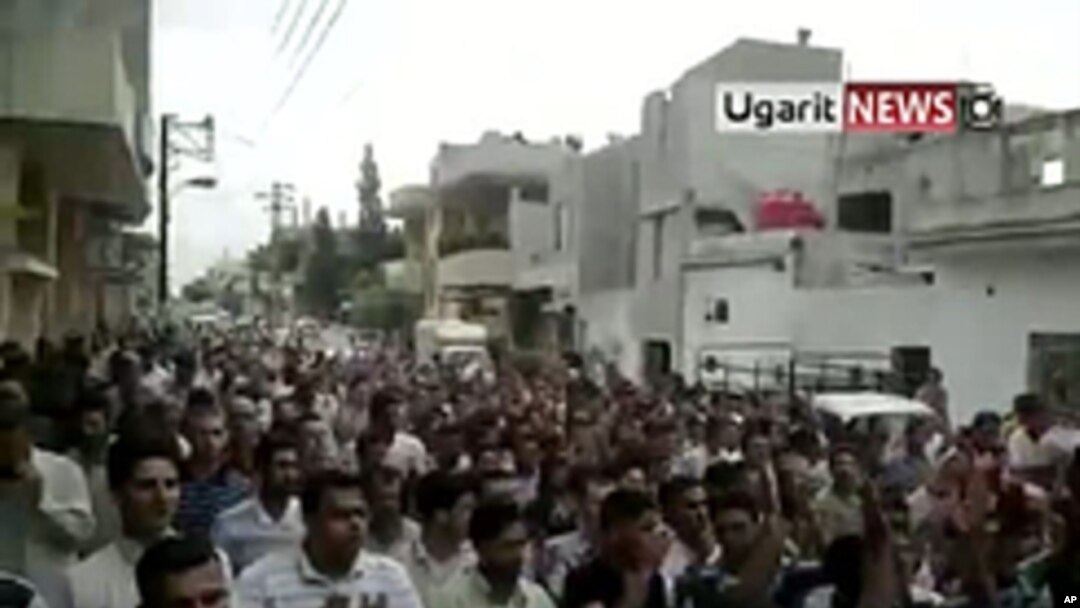The protests and crackdown are continuing in Syria in spite of growing international calls for an end to the violence, and an effort by the Syrian government to placate protesters with a formal “national dialogue.” Analysts say it will likely be difficult for either talks or international pressure to end the Syrian crisis anytime soon.
Pro-democracy activists in Syria remain undaunted by security forces matched against them.
For months now, they have taken to the streets across the country, usually after Friday prayers. The costs are high. Rights groups say at least 1,600 civilians have died in the government's crackdown.
The government puts the blame on terrorists and Islamists. And Syrian President Bashar al-Assad refuses to give up the power his family and Baath Party supporters have held for nearly 50 years.
Alia Brahimi is a Middle East expert at the London School of Economics:
“If Bashar al-Assad were to open up the political arena, were he to free up the media, were he to talk about free and fair elections, that would hasten the downfall of the regime," said Alia Brahimi. "And that is not something that he, but more importantly the people around him, would be willing to see happen.”
Yet earlier this week the government did convene a national dialogue, chaired by Vice President Farouk Al-Sharaa -- who expressed willingness to move toward a multi-party system.
Top activists boycotted the meeting...
And it ended without a breakthrough, beyond a call for the release of political prisoners.
Brahimi says just as Syrian officials see little room for democracy, protesters see no future for the regime.
“That’s what makes the situation so unstable and so dangerous, because while they view it in these stark terms, the protesters very much have a feeling that there’s no going back and that these sorts of protests are the only option they have available to them in terms of forcing a break with the past and building a better future," she said.
As the protests and repression continue, international outrage grows.
"These assaults must stop," she said.
Both U.S. Secretary of State Hillary Clinton and President Barack Obama say Mr. al-Assad has lost legitimacy.
"I think that increasingly you're seeing President Assad lose legitimacy in the eyes of his people and that's why we've been working at an international level to make sure that we keep the pressure up, to see if we can bring some real change in Syria," said President Obama.
But the Syrian government is not wilting under such pressure, and has won support from Arab League chief Nabil Elaraby. He rejects what he calls "foreign interference" in Syria.
Also this week, crowds of government supporters attacked the U.S. and French embassies in Damascus after the two countries’ ambassadors visited the restive city of Hama to express their support for protesters.
But while the West’s rhetoric on Syria matches what officials were saying about Libyan leader Moammar Gadhafi several months ago, there is no move toward military intervention as in Libya.
Richard Dalton is a former British Ambassador to Libya. He says western powers are reluctant to get involved in Syria, which has a much stronger military than Libya, and a much more central position in the volatile Middle East.
“You have to face the fact that the international community can not intervene in every situation where such oppression or worse developments arise," said Richard Dalton.
And even if the repression in Syria worsens, an intervention could trigger a major regional conflict, says Metsa Rahimi of the London-based Janusian Risk Advisory Group.
“There’s so much more at stake in Syria should the international community intervene," said Metsa Rahimi. "If the international community intervenes, we’re going to see reactions from Iran, notably, Lebanon, Israel, all around Syria.”
So the future of Syria may remain an internal issue, analysts say, and could take a long time to resolve, with lots more bloodshed along the way.


